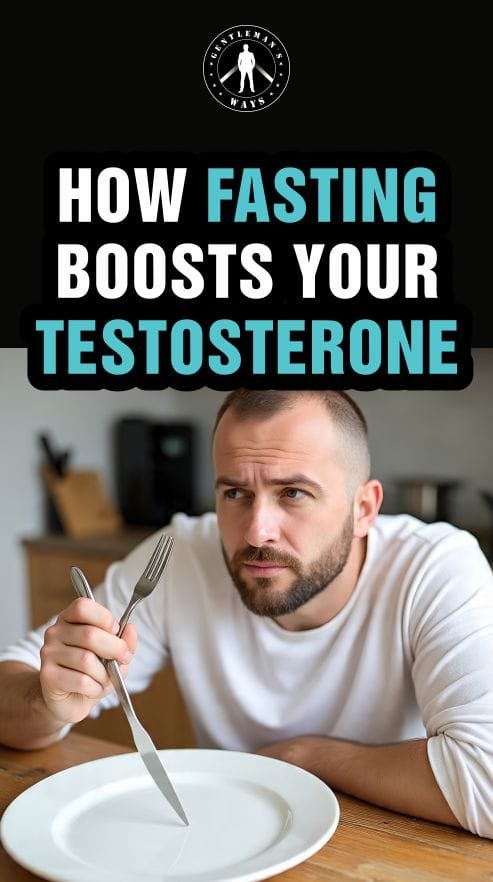Last updated on November 10th, 2025 at 07:48 am
Learn how fasting improves testosterone in men by boosting hormone balance, increasing energy, supporting muscle growth, and optimizing overall male health through strategic eating patterns.
How fasting improves testosterone in men is a topic gaining attention because what you eat and when you eat can affect your hormone levels.
Testosterone influences your energy, mood, muscle strength, and overall vitality.
When levels drop, you may notice fatigue, slower recovery, reduced focus, or lower physical performance.
Intermittent fasting, which cycles between periods of eating and fasting, creates a metabolic environment that may support testosterone production.
Pairing fasting with nutrient-rich foods like lean meats, fish, nuts, and vegetables provides your body with the building blocks it needs to maintain healthy hormone levels.
In this post, you’ll see practical ways fasting and targeted nutrition can support testosterone naturally, helping you maintain energy, strength, and overall male health.
Intermittent Fasting and Testosterone
Intermittent fasting (IF) can influence testosterone, a key hormone affecting men’s energy, mood, and muscle health.
Popular methods like 16/8, 18/6, and alternate-day fasting create conditions that support hormone regulation.
The 16/8 schedule, fasting 16 hours and eating in an 8-hour window, improves insulin sensitivity and reduces body fat, which can boost testosterone.
Extending fasting to 18/6 may further enhance hormone balance and stimulate human growth hormone, supporting testosterone production.
Alternate-day fasting, alternating between normal eating and fasting, improves metabolic health and body composition, particularly in overweight men.
By choosing a fasting method that fits your lifestyle, you can potentially increase testosterone naturally, improve energy, maintain muscle mass, and support overall male health.

How Intermittent Fasting Supports Testosterone
Intermittent fasting can support your testosterone naturally by influencing hormone balance, body fat, and energy levels.
Understanding how fasting interacts with your metabolism helps you see the benefits for your overall male health.
Improves Insulin Sensitivity and Fat Loss
When you fast, your insulin levels drop, and your body becomes more sensitive to it.
Lower insulin helps burn fat, especially the belly fat that produces estrogen, which can lower testosterone.
Reducing this fat creates a better hormonal environment and helps your body produce testosterone more efficiently, giving you more energy and improved metabolic health.
Boosts Growth Hormone Production
Fasting can trigger your body to release more growth hormone.
Increased growth hormone supports muscle growth, fat metabolism, and indirectly encourages higher testosterone production.
This combination helps you maintain strength, lean mass, and hormone balance naturally.
Enhances Hormonal Circulation
During fasting, your body may increase sex hormone-binding globulin, making testosterone more available in your bloodstream.
This means the hormone your body produces is easier to use, which can improve mood, energy, and overall vitality.
Supports Energy and Metabolic Health
By regulating hormones and reducing fat, intermittent fasting helps maintain steady energy levels throughout the day.
You feel more focused, stronger, and ready for physical activity, all of which support testosterone function and overall male health.
Related Posts
How Alcohol and Smoking Disrupt Testosterone in Men
High Testosterone in Men: Symptoms, Risks, and Management
How to Measure and Interpret the Testosterone Test
For Healthy Testosterone, Avoid These Foods
How Alcohol and Smoking Destroy Testosterone
Avoiding Pitfalls During Fasting
Intermittent fasting can support testosterone naturally, but certain mistakes may reduce its benefits or harm your health.
Knowing these common pitfalls helps you stay on track and maintain energy, focus, and hormonal balance.
Mind Your Food Choices
After fasting, your body may crave high-calorie or processed foods.
Eating too much of these can counteract the benefits of fasting.
Focus on nutrient-dense meals with lean proteins, healthy fats, and vegetables.
Planning your meals helps you avoid impulsive eating and supports testosterone production and overall energy levels.
Stay Hydrated
During fasting, it’s easy to forget about fluids. Dehydration can lower energy, impair focus, and affect hormone balance.
Drink water consistently, include hydrating foods like cucumbers or melons, and consider herbal teas or electrolyte drinks to maintain proper hydration.
Avoid Nutrient Gaps
Fasting without a balanced diet can lead to vitamin and mineral deficiencies.
Essential nutrients support testosterone, metabolism, and overall male health.
Include a variety of whole foods, such as eggs, nuts, fish, and vegetables, to maintain hormone function and long-term vitality.
Listen to Your Body
Pushing yourself too hard during fasting can backfire.
Pay attention to fatigue, dizziness, or irritability, and adjust your eating window or meal composition.
Proper pacing ensures your body responds positively, helping maintain energy, focus, and testosterone levels.
Testosterone-Friendly Diet Strategies
Eating the right foods can support your testosterone naturally, boost energy, and help maintain lean muscle. By focusing on key nutrients, fats, and proteins, you give your body what it needs for hormone balance.
Include Healthy Fats
Healthy fats provide the building blocks for testosterone.
Foods like avocados, nuts, seeds, and olive oil support hormone production and overall male health.
Including these in meals helps your body maintain balanced testosterone levels while supporting heart and brain health.
Prioritize Lean Protein
Protein is essential for muscle repair and tissue growth, which links directly to testosterone production.
Incorporate chicken, turkey, fish, eggs, and legumes in your meals.
Adequate protein helps maintain muscle mass, supports strength, and provides the amino acids your body needs to function optimally.
Focus on Key Vitamins
Vitamins D and B play an important role in testosterone regulation and energy production.
Vitamin D comes from sun exposure and fatty fish, while B vitamins are found in eggs, leafy greens, and whole grains.
Consistent intake helps keep hormones stable and supports overall vitality.
Ensure Mineral Intake
Minerals like zinc and magnesium are essential for hormone health.
Zinc is in red meat, shellfish, and legumes.
Magnesium is in leafy greens, nuts, and whole grains.
Maintaining these nutrients in your diet supports testosterone production, energy, and overall male well-being.
Healthy Fats and Hormone Production
Healthy fats are essential for testosterone production and overall hormone balance in men.
Foods like olive oil, avocados, nuts, and fatty fish provide monounsaturated and omega-3 fatty acids that support hormone synthesis and metabolic health.
Olive oil, rich in oleic acid, and avocados supply nutrients that promote energy and testosterone regulation.
Nuts such as almonds and walnuts offer a mix of omega-3 and omega-6 fatty acids, aiding hormone production.
Fatty fish like salmon deliver omega-3s that enhance testosterone while reducing inflammation.
Avoiding trans fats and processed oils is important, as these can disrupt hormonal balance and lower testosterone levels.
By including healthy fats in your diet and choosing whole, natural foods, you can maintain testosterone, support energy, and improve overall male health.
Conclusion
Fasting can help you support testosterone naturally by improving hormone balance, boosting energy, and supporting lean muscle growth.
Pairing intermittent fasting with a nutrient-rich diet gives your body what it needs to maintain testosterone production, metabolic health, and overall vitality.
By including healthy fats, lean proteins, and key vitamins and minerals, you can create a strong foundation for male health.
Staying hydrated, managing stress, and getting quality sleep further reinforce these benefits.
Choosing the right fasting schedule and maintaining consistent, balanced meals allows your body to respond positively, helping you feel stronger, more focused, and energized.
Frequently Asked Questions
How does intermittent fasting improve testosterone?
Intermittent fasting reduces insulin levels, promotes fat loss, and stimulates growth hormone, all of which create a favorable environment for testosterone production in men.
What foods support testosterone during fasting?
Focus on lean proteins, healthy fats like avocado and olive oil, and nutrient-rich foods with zinc, magnesium, and vitamins D and B.
How long should I fast to see results?
Fasting schedules like 16/8 or 18/6 provide a balance of fasting and eating windows that support hormone regulation and testosterone optimization.
Can lifestyle habits affect testosterone while fasting?
Yes, sleep, stress management, and regular exercise work alongside fasting and diet to maintain testosterone, energy, and overall male health.
References
- How Intermittent Fasting Affects Testosterone Levels in Men
- Does Fasting Boost Testosterone: Fact or Fiction?
Pyo Merez is a men’s lifestyle enthusiast and writer about the gentleman’s place and impact on society. Raised by a distinguished gentleman dad, he offers unique insights into how the mind of a gentleman works and how societal norms shape gentlemen’s identity and vice versa.
Through his insightful articles, Pyo taps into the depths of gentleman culture to provide perspectives on etiquette and manners in modern society.

